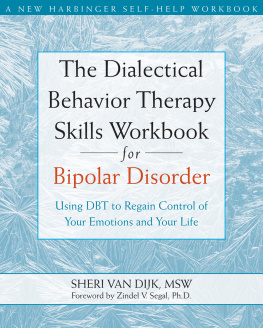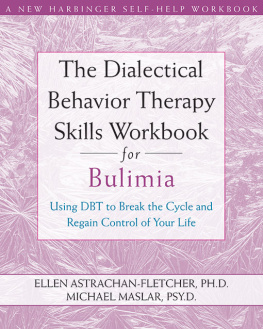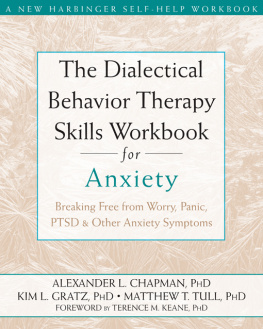Sheri van Dijk - The Dialectical Behavior Therapy Skills Workbook for Bipolar Disorder: Using DBT to Regain Control of Your Emotions and Your Life
Here you can read online Sheri van Dijk - The Dialectical Behavior Therapy Skills Workbook for Bipolar Disorder: Using DBT to Regain Control of Your Emotions and Your Life full text of the book (entire story) in english for free. Download pdf and epub, get meaning, cover and reviews about this ebook. year: 2009, publisher: New Harbinger Publications, genre: Religion. Description of the work, (preface) as well as reviews are available. Best literature library LitArk.com created for fans of good reading and offers a wide selection of genres:
Romance novel
Science fiction
Adventure
Detective
Science
History
Home and family
Prose
Art
Politics
Computer
Non-fiction
Religion
Business
Children
Humor
Choose a favorite category and find really read worthwhile books. Enjoy immersion in the world of imagination, feel the emotions of the characters or learn something new for yourself, make an fascinating discovery.
- Book:The Dialectical Behavior Therapy Skills Workbook for Bipolar Disorder: Using DBT to Regain Control of Your Emotions and Your Life
- Author:
- Publisher:New Harbinger Publications
- Genre:
- Year:2009
- Rating:4 / 5
- Favourites:Add to favourites
- Your mark:
- 80
- 1
- 2
- 3
- 4
- 5
The Dialectical Behavior Therapy Skills Workbook for Bipolar Disorder: Using DBT to Regain Control of Your Emotions and Your Life: summary, description and annotation
We offer to read an annotation, description, summary or preface (depends on what the author of the book "The Dialectical Behavior Therapy Skills Workbook for Bipolar Disorder: Using DBT to Regain Control of Your Emotions and Your Life" wrote himself). If you haven't found the necessary information about the book — write in the comments, we will try to find it.
Sheri van Dijk: author's other books
Who wrote The Dialectical Behavior Therapy Skills Workbook for Bipolar Disorder: Using DBT to Regain Control of Your Emotions and Your Life? Find out the surname, the name of the author of the book and a list of all author's works by series.
The Dialectical Behavior Therapy Skills Workbook for Bipolar Disorder: Using DBT to Regain Control of Your Emotions and Your Life — read online for free the complete book (whole text) full work
Below is the text of the book, divided by pages. System saving the place of the last page read, allows you to conveniently read the book "The Dialectical Behavior Therapy Skills Workbook for Bipolar Disorder: Using DBT to Regain Control of Your Emotions and Your Life" online for free, without having to search again every time where you left off. Put a bookmark, and you can go to the page where you finished reading at any time.
Font size:
Interval:
Bookmark:

Finally, a straightforward and compassionate resource for anyone wanting to understand more about bipolar disorder. The combination of personal stories and practical exercises provides a powerful guide to living a balanced and joyful life.
Susan Philpott, M.Sc., MSW, mental health supervisor at York Support Services Network in Sutton West, Ontario, Canada
In this thorough and engaging workbook, Sheri Van Dijk breaks new ground by adapting dialectical behavior therapy for people living with bipolar disorder. This workbook provides patients struggling with this illness with a clear program and real-life day-to-day tools for coping. This workbook will help many people with bipolar disorder find order in their lives. A welcome addition to the helping field.
Paul Cappuccio, MSW, RSW, clinical manager of outpatient mental health services as Southlake Regional Health Centre and lecturer at Queens University
Medication is the foundational treatment for bipolar disorder. However, medication use alone often results in failed relationships, financial demise, and continued symptoms of depression and anxiety. Van Dijks Dialectical Behavior Therapy Skills Workbook for Bipolar Disorder can help to increase readers personal serenity, interpersonal harmony, and intimacy in relationships, and optimize their quality of life. This book is clear, concise, and very readable, filled with wise guidelines that are rewarding and practical to implement.
Stephen B. Stokl, MD, FRCP, chief of psychiatry at Southlake Regional Health Centre in Newmarket, Ontario, Canada, and author of Mentally Speaking

Publishers Note
This publication is designed to provide accurate and authoritative information in regard to the subject matter covered. It is sold with the understanding that the publisher is not engaged in rendering psychological, financial, legal, or other professional services. If expert assistance or counseling is needed, the services of a competent professional should be sought.
Distributed in Canada by Raincoast Books
Copyright 2009 by Sheri Van Dijk
New Harbinger Publications, Inc.
5674 Shattuck Avenue
Oakland, CA 94609
www.newharbinger.com
The Mood Disorder Questionnaire, 2006 by R. Hirschfeld, is used by permission of the publisher.
All Rights Reserved
ePub ISBN: 9781608827268
Acquired by Tesilya Hanauer; Cover design by Amy Shoup;
Edited by Carole Honeychurch; Text design by Tracy Carlson
The Library of Congress has Cataloged the Print Edition as:
Van Dijk, Sheri.
The dialectical behavior therapy skills workbook for bipolar disorder: using DBT to regain control of your emotions and your life / Sheri Van Dijk ; foreword by Zindel V. Segal.
p. cm.
Includes bibliographical references.
ISBN-13: 978-1-57224-628-7 (pbk. : alk. paper)
ISBN-10: 1-57224-628-6 (pbk. : alk. paper)
1. Manic-depressive illness--Treatment--Popular works. 2.
Dialectical behavior therapy--Popular works. 3. Manic-depressive persons--Life skills guides. I. Title.
RC516.V36 2009
616.89506--dc22
2009014664
This book is dedicated to my mother and father, Paulette and Rinty Van Dyk. From the two of you I learned that I can achieve whatever I put my mind to. Thank you for being my teachers, mentors, and friends.
If you have bipolar disorder (BD), you know that it can have a huge effect on your life and even put your life at risk. The typical treatment for BD involves medications that are pretty effective in curbing the extreme mood swings that define this condition. Still, there is a growing recognition that BD is not something you simply get over and never have again. In fact, relapse and recurrence are common. Living with BD in the long run involves managing it the same way you would manage a chronic disease such as asthma, high blood pressure, or diabetes. You combine medical treatment with lifestyle changes to reduce the risk of aggravating your symptoms and bringing on an episode. You learn to recognize the moments in which you have a choice about something thats going to affect your emotions, and you learn to choose the behavior thats going to help you cope and regulate your mood, even when youre in the midst of the uncomfortable symptoms of bipolar disorder. This involves learning new skills and attitudes.
There is, however, an interesting paradox that arises when you use psychological strategies to manage the difficulties of BD. The very tool required for this workthe mindis often touched by the disorder itself. The behavioral school of psychology has responded to this by sidestepping the mind, instead focusing on behavior and relying on the consequences of that behavior to bring relief. A second approach, cognitive therapy, uses logic and evidence to change the degree to which you believe in your thoughts, which ultimately changes your behavior. Either way, the result is that you come to know your mind and recognize its capacity for choice and change within moments of feeling bipolar symptoms.
The approach presented by Sheri Van Dijk in this clearly written and practical book combines the best elements of behavioral and cognitive work with the fruits of mindfulness training to acquaint you with both the territory of BD and the possibility of coping differently. This workbook starts from the premise that we are often unaware of how unspoken attitudes and beliefs can influence our view of the world around us. To help you cultivate a greater awareness of these silent influences on your behavior, the author provides a number of exercises that help to build awareness of present-moment experience and its corollary, the inevitable mind-wandering and daydreaming that occurs when we attempt to do only one thing at a time. An important theme that is returned to throughout the book is that managing the ups and downs that go along with BD involves learning how to survive a crisis.
Regardless of whether a difficulty is personal, interpersonal, or financial, you can determine whether your reactions will make it better or worse. The first step, that of acceptance, may seem counterproductive or even feel like resignation; perhaps it seems like the last thing you would choose to do. In fact, acceptance is the first step toward responding effectively rather than simply reacting to challenges. Because acceptance requires you to let go of some habitual tendencies to push away or minimize unpleasant experiences, you are able to see more clearly what it is that you are up against and choose healthier action.
Additional sections on emotional intelligence, distress tolerance, and interpersonal effectiveness offer you a wide repertoire of new skills and abilities. A later chapter considers the needs of family members. This is important because the quality of care received by people with BD is often determined by those around them.
Bipolar disorder continues to present a challenge to both its sufferers and the mental health community. There are too few workbooks such as this one, in which the needs of people with BD are placed foremost and an approach for helping them learn how to manage overwhelming emotions is so clearly articulated. I expect it will be a valuable resource for years to come.
Zindel V. Segal, Ph.D. professor of psychiatry, University of Toronto author of The Mindful Way Through Depression
Introduction
Font size:
Interval:
Bookmark:
Similar books «The Dialectical Behavior Therapy Skills Workbook for Bipolar Disorder: Using DBT to Regain Control of Your Emotions and Your Life»
Look at similar books to The Dialectical Behavior Therapy Skills Workbook for Bipolar Disorder: Using DBT to Regain Control of Your Emotions and Your Life. We have selected literature similar in name and meaning in the hope of providing readers with more options to find new, interesting, not yet read works.
Discussion, reviews of the book The Dialectical Behavior Therapy Skills Workbook for Bipolar Disorder: Using DBT to Regain Control of Your Emotions and Your Life and just readers' own opinions. Leave your comments, write what you think about the work, its meaning or the main characters. Specify what exactly you liked and what you didn't like, and why you think so.













